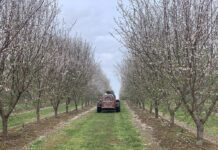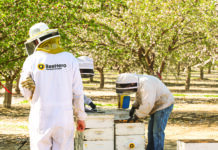
What started out as a joke and a distraction during the COVID pandemic shutdown has
morphed into the direct-to-consumer brand Sweet AF (Sweet Arnold Farms) for the Atwater-based family farming operation.
“It was a fun little side project and gave us something to look forward to,” said Craig Arnold, who grows almonds, cling and freestone peaches, and organic sweet potatoes with his father, Bill.
The brand also was born out of what the younger Arnold saw as changing consumer shopping patterns.
“I was watching, and consumers switched their shopping to pick-up and buying everything on Amazon and having everything shipped direct,” he said. “I kept looking at it and wondered, ‘Why can‘t we do a little of that?’ Almond prices are going down to the grower, but the price in the stores and everyplace else is holding. So that just told me all the money was being made in the middle.”
Beginning with the 2022 season, Arnold Farms offered fresh peaches in season, sweet potatoes and flavored and roasted almonds to consumers for in-person pickup at their farm office or for local shipment.
Although Arnold said he doesn’t expect the Sweet AF brand to ever provide the bulk of their income, he said he’d like to grow it to where they could support local groups and organizations more than they do now.
“Part of the motivation is when it’s making a little bit, I’d like to take that money and put a lot of that into the community if I can,” he said.

Birth of a Consumer Brand
Craig Arnold’s wife, Amanda, and office manager Jessica Egli developed the Sweet AF logo. In addition to their ag products, they also sell logo merchandise, including t-shirts, caps and insulated commuter mugs.
From the start, Arnold said they decided to sell online and designed a secure website, sweetarnoldfarms.com. Sweet AF also has a presence on social media that includes Facebook and Instagram. Egli handles sales and social media posts.
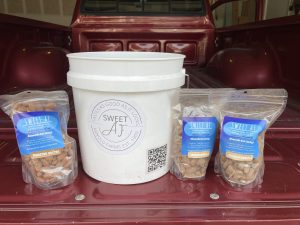
Selling What They Grow
The Sweet AF product line started with almonds. The Northern Merced Hulling Association in Ballico hulls them, while Monte Vista Farming Co. in Denair processes the kernels and packs 1,000 pounds at a time in 50-pound boxes. He said they use sheller-select 27/30 Nonpareils, considered a premium grade.
A Ballico company adds the flavors that include roasted-salted, Cheez-o, Snickerdoodle and Sweet Srircha. Snickerdoodle-flavored almond butter, sold in 8-ounce jars, also is made locally.
Last summer, Sweet AF added fresh peaches sold in buckets equivalent to 10 pounds and 25 pounds. Much like a refillable beer growler, customers can exchange the buckets when they return for more peaches.
Sweet potatoes from Arnold Farms’ climate-controlled storage facility are available much of the year in 3- and 5-pound boxes, which are more convenient for customers than industry-standard 20- and 40-pound cartons. So far, Arnold said customer feedback has been very encouraging.
“With fresh peaches, people come back with a lot of memories of getting fresh peaches years ago, especially here,” he said. “A lot of people remember going to J.R. Wood Fruit Co. when they were downtown. They could pull peaches right off the line.”
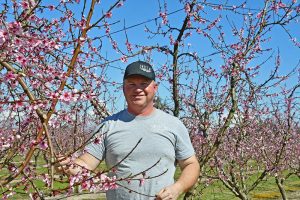
Push Toward Streamlining
Developing the brand also comes at a time when the family farming operation is striving to improve efficiency, decrease costs where it makes sense, and adopt more mechanization.
Last winter, the Arnolds pulled an old almond orchard and plan to lease the ground to a local sweet potato grower for the next two years. Not only will that help break the pest cycle, but it is expected to give them time to research what crop holds the best potential.
Increasing production costs, particularly labor, also prompted them to reduce peach acreage from 180 acres in years’ past to this year’s 80 acres.
Last year, the California Canning Peach Association, which negotiates prices with processors on behalf of grower-members, was able to obtain a small price increase. And Arnold said he hoped that occurred again this season.
“The price increase last year was pretty much eaten up with labor and fertilizer costs,” he said. “This year, I’m hoping for another modest price increase, and hopefully labor will be available. It’s getting really tough to find anybody who’s willing to work a full day picking peaches.”
Labor costs also caused Arnold Farms to cut their sweet potato acreage this season to about 80 acres, less than half what it was last year. They are focusing entirely on organic production because of added premiums.
“I love growing peaches and I love growing sweet potatoes; I just really enjoy it,” Arnold said. “But with the added troubles of labor, especially because both of them are increasingly labor intensive, I understand why almonds are so appealing.”
This year, Arnold Farms also plans to plant 35 acres of French colombard winegrapes. Although Arnold admitted the white variety probably won’t net as much as one of the more popular varietals, such as sauvignon blanc, he’s banking on continued demand for its use in blending.
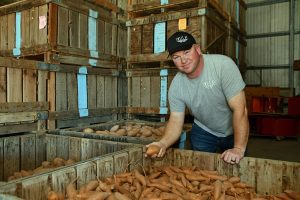
In addition, the operation plans to fully mechanize the vineyard from pruning to harvest, he said.
As part of diversification, Arnold Farms rents wooden field bins, each marked with its signature blue paint. The side business started with 5,000 bins as a partnership with a local fruit processing company. It has grown to the current 50,000 bins that also are rented to local sweet potato growers.
Active in the Ag Industry
Craig Arnold pointed to his great grandfather for starting the family’s Merced County farming legacy in 1909. As the family story goes, the elder Arnold either owned a grocery store or worked for one in San Francisco and left the city after the Great 1906 Earthquake and subsequent fire.
In the early 1900s, the Arnold’s farm was planted to grain crops and peanuts. Once the Merced Irrigation District brought surface water to the area, the crop mix evolved to include fruits, nuts and vegetables.
Craig Arnold, who received a bachelor’s degree in agricultural business from California State University, Chico, in 2003, said there was never any question about returning to the family farm. He, his father and his uncle, Glenn, farmed together until Glenn passed away in 2019.
Over the years, Arnold Farms has cooperated in University of California Cooperative Extension field trials, including at least two that involved almond rootstocks. A previous one yielded the Bright’s hybrid rootstock. The current trial, established 8 to 10 years ago by then-UCCE farm advisor David Doll, comprises 10 acres near Winton.
“All of these things take 20 years to prove out,” Craig Arnold said. “If no one is willing to do the trials and willing to help with the research, how are we going to move the industry forward? We have these great resources out there with UC Cooperative Extension, UC and the state campuses. If they want to do the work on a project, I’m going to help them the best I can.”
The Arnolds embraced that same philosophy as a cooperator in a UC groundwater recharge trial from 2015-17 in a Delhi-area almond orchard.
Doll, who has been managing director of Rota Unica almonds in Portugal since leaving UCCE in November 2018, said the Arnolds’ involvement in the trials were “priceless” in helping develop local best practices.
“They contributed by providing teams to prepare fields, help plant and harvest the trial,” Doll wrote in an email from Portugal. “This has led to significant contributions to the almond industry, which included the identification of sodium and chloride tolerance of peach-almond hybrid rootstocks, rates of copper for management of bacterial spot, use of almonds for groundwater recharge and many more. Within peaches, they tested multiple varieties and rootstocks, which help extend the life of the industry. And with sweet potatoes, they have worked to identify new varieties while determining ways to reduce chemical usage.”
On a more personal level, Doll said he didn’t know where he would have been without them. “The Arnolds provided me with guidance from my first day, something in which I will be forever grateful. It was a privilege to work with them.”
Despite their busy schedules, both Bill and Craig Arnold are active in several agricultural groups. Bill is on the Merced County Farm Bureau board, while Craig sits on the California Canning Peach Association board, the California Sweetpotato Council executive board and several Merced Irrigation District advisory committees.
The younger Arnold said they volunteer their time because agriculture needs to be represented, especially with the ever-increasing flow of restrictions from Sacramento.
“I know we have all of these different regulations coming and I know we have these people on elected boards that are going to push all of these rules and regulations,” Craig Arnold said. “I want to be on the front side of them. Most of these are coming whether we want them or not. I want to have a say in them. I could sit back and complain, or I could at least try to be in the mix and knowledgeable and forecast where to position the company.”
As a fourth-generation farmer, Craig Arnold said he wonders whether the operation will still be around for the fifth generation, his 10-year-old daughter and 8-year-old son, when they’re old enough to farm.
“One of my constant questions is, ‘Do I keep fighting through and leave them a life like I grew up with? It’s a good life. You can make a decent living and come out with a lot of values and work ethics, or do I set them up with different options?’ I could easily sell everything.
“Right now, they want to come back, my daughter especially. I don’t know what’s going to happen in 10 more years. A lot can change, and a lot has changed.”


